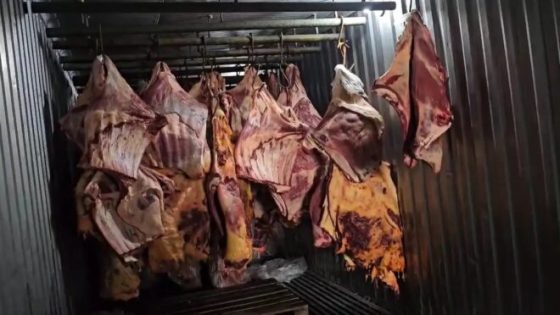On January 22, four entrepreneurs were arrested for selling spoiled meat that had been submerged for days during floods in Rio Grande do Sul. Investigations reveal they made over 1,000% profit by chemically altering the meat and selling it to unsuspecting markets across Brazil. How could such a dangerous scheme go unnoticed?
- Four businessmen arrested for selling spoiled meat
- 800 tons purchased for R$ 80,000
- Meat chemically altered to hide deterioration
- Risk to public health from consumed meat
- Investigation linked to previous meat disposal
- Charges include food adulteration and corruption
Four Arrested for Selling Spoiled Meat in Brazil: What Happened?
How could a business profit from such a dangerous practice? The arrested individuals operated a company that was supposed to recycle expired products but instead sold tainted meat. This shocking case has drawn attention to food safety in Brazil.
Health Risks Associated with Consuming Spoiled Meat
Consuming spoiled meat can lead to severe health issues, including food poisoning and other gastrointestinal problems. This case serves as a reminder of the importance of food safety regulations. Here are key points to consider:
- Spoiled meat can harbor harmful bacteria.
- Improper handling and storage increase health risks.
- Consumers should always check the source of their meat.
- Regulations must be enforced to prevent such incidents.
Investigation Reveals Shocking Practices in Meat Sales
The investigation began when a meat processing plant identified tainted products linked to a batch that had been discarded. This led authorities to uncover a network of businesses selling spoiled meat disguised as safe products. The entrepreneurs had acquired 800 tons of meat for R$ 80,000 but claimed it was worth R$ 5 million. How could they justify such a massive markup?
Legal Consequences for the Entrepreneurs Involved
The arrested individuals face serious charges, including criminal association and food adulteration. This case highlights the need for stricter enforcement of food safety laws. What penalties should they face for putting public health at risk?
Implications for Food Safety Regulations in Brazil and Beyond
This scandal raises questions about food safety regulations not only in Brazil but also in other countries. Ensuring that food products are safe for consumption is crucial. Consumers must remain vigilant and informed about where their food comes from. How can we improve food safety standards globally?
In conclusion, the sale of spoiled meat by these entrepreneurs poses a significant threat to public health. It serves as a wake-up call for consumers and regulators alike to prioritize food safety and ensure that such dangerous practices are eradicated.































